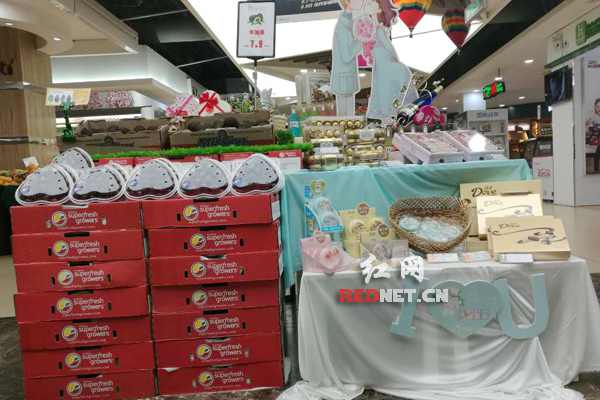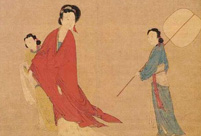

 |
| Special gifts for Qixi are on sale in a shopping center in Changsha, capital of Hunan province. |
As China enjoys its traditional Aug. 9 Valentine’s Day, also known as Qixi Festival, which is held every year on July 7th according to Chinese lunar calendar, many in the business world are eagerly awaiting the annual “romance economy” boost. Few consumers are safe from holiday's increasingly materialistic demands; even single people are potential customers. Given the growing commercialism attached to traditional Chinese festivals, it's unsurprising to find mixed opinions about the future of these holidays.
A week before Qixi Festival, many shopping malls had already launched their Valentine's-themed promotions. According to business owners, ladies’ wear, jewelry and cosmetic products usually witness a minor bump in sales on the eve of the annual celebration.
“Jewelry will see a significant sales bump during Qixi Festival, so each year we announce special promotions to attract potential customers,” said one salesperson at a shopping mall in Beijing.
Meanwhile, as a common choice for Valentine's gifts, roses grow in popularity and demand on the day of the festival. According to a florist in Beijing's Haidian district, the wholesale prices of roses and other flowers doubled in the days leading up to the festival. “I can't even estimate how much retail prices will be on that day,” the florist said.
In addition to physical shops, e-commerce vendors also want a piece of this lucrative cake. Data from T-mall, China’s leading online retail platform, shows that daily sales figure of roses around Qixi Festival 2014 was 2.1 million yuan ($315,000), whereas that figure in 2015 was 4.15 million yuan, demonstrating a growth of 97 percent. Even items normally not associated with romance, such as snacks, beverages, vegetables and fruit are often classified as Qixi products for the sake of the Qixi sales boost.
Hotel reservations, too, are part of the romance economy. Some hotel rooms are booked as early as May. Based on statistics released by Qunar, a Beijing-based hotel reservation service, around 97 percent of hotel rooms in first- and second-tier cities were rented out for Qixi Festival by Aug. 5. This is a 34 percent increase from last year’s number. Bookings for romance- and couples-themed rooms increased 130 percent from last year.
Though typically viewed as a day for lovers, Qixi Festival also benefits single people. Many customers seize the opportunity to indulge in a little shopping, regardless of their relationship status.
“Since there are lots of promotions on that day, I think it's a great occasion for ‘treasure-hunting,’” Miss Zhou noted.
While business owners are fighting over the Qixi market, the general public seems to have mixed opinions when it comes to this growing commercialization.
Li Yan, a man in his 30s, explained that he honestly couldn't think of another gift to get his wife for Qixi Festival, since he just bought her a set of cosmetics on May 20, a date for which the pronunciation sounds like “I love you” in Chinese.
“Financial cost is not the biggest issue. Now that every day can be a ‘festival,’ it's more about the formality,” Li said.
Folklorists have pointed out that Qixi Festival is not a perfect analog to Valentine’s Day since it commemorates the faithful love between husbands and wives, not valentines in the conventional sense. Yet some people are not bothered by this cultural connotation.
“These festivals are just excuses for people to take a break from their fast-paced lives. We do not need to read too much into it,” said Mrs. Zhu, who works at a foreign enterprise in Beijing.
 Spectacular bridge with one of the tallest piers in the world
Spectacular bridge with one of the tallest piers in the world Magnificent view of Hukou Waterfall
Magnificent view of Hukou Waterfall A glimpse of Stride 2016 Zhurihe B military drill
A glimpse of Stride 2016 Zhurihe B military drill US Navy chief tours Liaoning aircraft carrier
US Navy chief tours Liaoning aircraft carrier Chinese American woman wins Miss Michigan
Chinese American woman wins Miss Michigan Centenarian couple takes first wedding photos
Centenarian couple takes first wedding photos Traditional Tibetan costumes presented during fashion show
Traditional Tibetan costumes presented during fashion show How did ancient people escape the summer heat
How did ancient people escape the summer heat Breathtaking scenery of Hulun Buir grassland
Breathtaking scenery of Hulun Buir grassland Top 10 livable Chinese cities
Top 10 livable Chinese cities Top 20 hottest women in the world in 2014
Top 20 hottest women in the world in 2014 Top 10 hardest languages to learn
Top 10 hardest languages to learn China’s Top 10 Unique Bridges, Highways and Roads
China’s Top 10 Unique Bridges, Highways and Roads Risk management key to peace at sea
Risk management key to peace at sea  Wannabe actors in China's Hollywood
Wannabe actors in China's Hollywood  Horton displays no goodwill in remarks over his rival
Horton displays no goodwill in remarks over his rival  China’s athletes in Brazil only dine on meals prepared by Chinese chefs
China’s athletes in Brazil only dine on meals prepared by Chinese chefs Day|Week